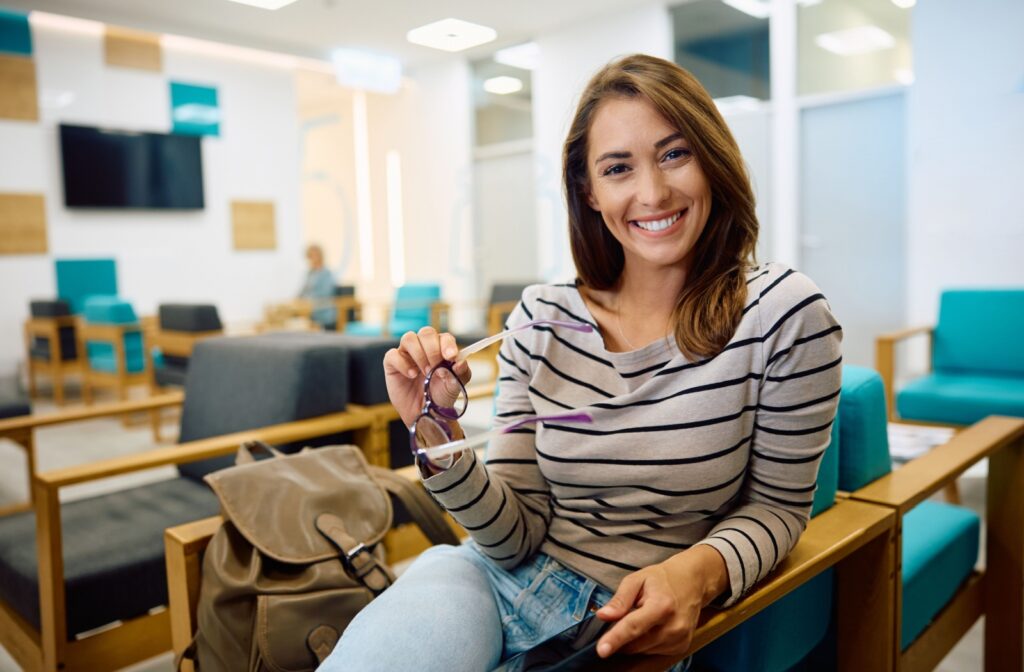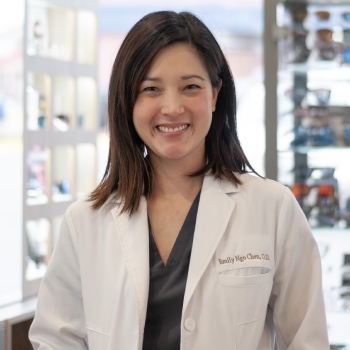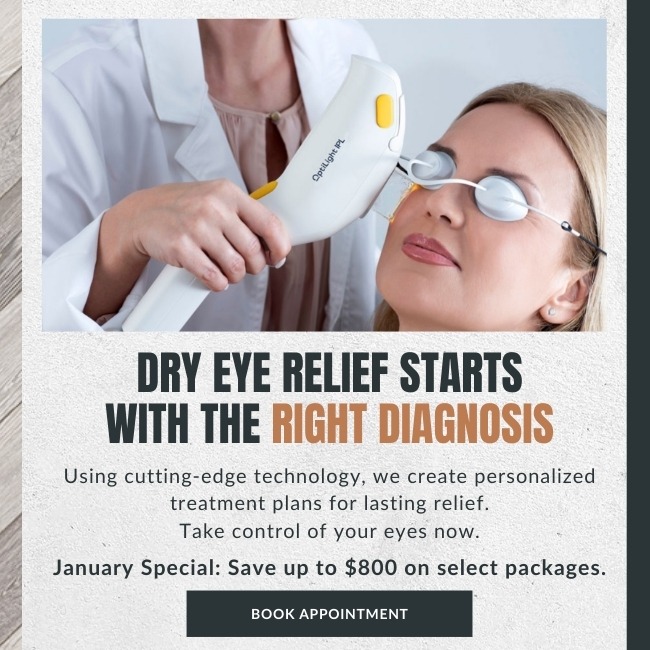Whether you’re trying to squeeze an appointment into a packed schedule or whether you’re a parent planning your child’s first pediatric eye exam, knowing how long an eye exam can take can help you prepare and ensure these important check-ins aren’t missed. Fortunately, comprehensive eye exams typically only take roughly thirty minutes, making them easy to slot into a busy schedule.
Types of Eye Exams
While most comprehensive eye exams take an average of 30 minutes, the actual duration can vary depending on the exam type, as different tests take varying amounts of time.
Comprehensive Eye Exam
This is your all-inclusive annual check-up. A comprehensive eye exam evaluates your overall eye health and vision, screening for glaucoma, cataracts, and macular degeneration. It also measures your vision for glasses prescriptions. This exam is expertly designed to identify early signs of any potential eye issues.
Pediatric Eye Exam
Children’s eye exams are slightly quicker but just as thorough. They usually focus on detecting vision issues that affect learning, such as nearsightedness, farsightedness, or lazy eye. Pediatric exams often use kid-friendly technology to help keep young patients engaged and comfortable.
Contact Lens Exam
If you wear contact lenses or are considering switching to them, a contact lens exam also involves additional tests. It’s not only about getting your prescription right—it also checks the curvature of your eye and evaluates its surface to ensure the ideal fit for comfort and health. Expect this type of appointment to take a little longer than standard exams.
Medical Eye Exam
Unlike a comprehensive eye exam, a medical eye exam focuses on specific medical conditions impacting your eyes, like diabetes, cataracts, glaucoma, or macular degeneration. Because it can involve specialized testing, the duration may vary depending on the complexity of the condition.
Key Difference: A comprehensive eye exam evaluates overall eye health and vision, whereas a medical eye exam addresses specific medical concerns. Both types of exam can be important—your eye doctor can advise which is right for you.
What Determines How Long an Eye Exam Takes?
While 30 minutes is the average length of an eye exam, several factors can influence the timing.
- Type of Exam: Comprehensive and contact lens exams often take longer than pediatric or quick vision screenings.
- Technology Used: Tools like digital retinal imaging (Optomap) or visual field testing can extend the length of an appointment, but can offer important insights about your eye health.
- Patient Age: Children’s exams tend to be shorter, as the testing is more straightforward and often more focused on vision development and immediate needs. Adult exams may explore a broader range of potential eye health issues.
- Health History: Your medical, vision, and current issues may require additional time for discussion and testing.
- Special Circumstances: Addressing symptoms like sudden vision changes or preparing for a specific treatment may lengthen your visit.
Do Eye Exams for Children Take Less Time Than Adults?
Yes, children’s eye exams are typically slightly shorter because they focus on issues relevant to a child’s age, such as early vision development and detecting problems like lazy eye. However, these exams are still thorough and just as important as adult exams. At See & Co, we only see children seven and up. Any exams before then should be administered by a pediatric optometrist.
What Happens During an Eye Exam?
Eye exams are comprehensive health evaluations—and they’re more fascinating than you might think. Here’s what typically happens:
Step 1: Patient History
You’ll discuss your medical and vision history, including current symptoms or concerns. This will ensure that the exam meets your specific vision needs.
Step 2: Vision Assessment
A series of tests will determine the accuracy of your vision. Expect to read eye charts and look through a phoropter as your doctor refines your prescription (if needed).
Step 3: Eye Health Evaluation
Modern offices often use technology to provide deeper insights into your eye health. For instance:
- Optomap Imaging: Takes a detailed, 200-degree photo of your retina, revealing what’s hard to see with the naked eye.
- Visual Field Testing: Assesses peripheral vision to detect issues like glaucoma.
Our investment in cutting-edge tools helps offer the most accurate diagnoses in less time.
Step 4: Additional Tests (if necessary)
Depending on your age, symptoms, or preferences, other specialized tests may check for signs of cataracts, diabetic eye disease, or macular degeneration.
A tip for parents who bring kids is to keep them engaged. Offices like ours often use interactive tools and child-friendly visuals to make the process fun.
How Often Do I Need an Eye Exam?
Eye exams are crucial for maintaining good vision and early detection of potential health issues. But how often should you visit your eye doctor?
- Adults should aim for a yearly comprehensive eye exam, especially if they wear corrective lenses or are over 40 when risks for age-related conditions like glaucoma increase.
- At See & Co we only see children seven and up. However, before that, children should have their first pediatric eye exam by six months, followed by another check-up at age three and annually once they start school.
- Those with medical conditions like diabetes or a family history of eye diseases may need more frequent annual exams tailored to their specific needs.
Taking care of your eyes means taking action before issues arise. An eye exam isn’t just a check-up—it’s an investment in your overall health. Consistent check-ups ensure lasting vision health and provide peace of mind for you and your family.See & Co ensures that your exam is as informative and seamless as possible by using specialty technology, providing tailored care, and having knowledgeable staff ready to answer your questions. Contact us today to book your next comprehensive eye exam and see the difference yourself.




